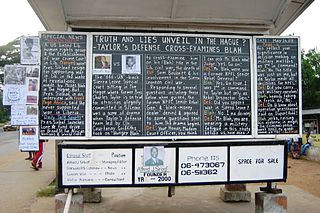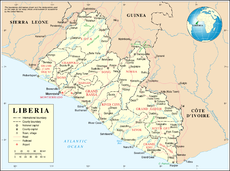
The United Nations Mission in Sierra Leone (UNAMSIL) was a United Nations peacekeeping operation in Sierra Leone from 1999 to 2006. It was created by the United Nations Security Council in October 1999 to help with the implementation of the Lomé Peace Accord, an agreement intended to end the Sierra Leonean civil war. UNAMSIL expanded in size several times in 2000 and 2001. It concluded its mandate at the end of 2005, the Security Council having declared that its mission was complete.

The United Nations Mission in Liberia (UNMIL) was a United Nations peacekeeping operation established in September 2003 to monitor a ceasefire agreement in Liberia following the resignation of President Charles Taylor and the conclusion of the Second Liberian Civil War (1999–2003). At its peak it consisted of up to 15,000 UN military personnel and 1,115 police officers, along with civilian political advisors and aid workers.

United Nations Security Council resolution 1289 was adopted unanimously on 7 February 2000. After recalling resolutions 1171 (1998), 1181 (1998), 1231 (1999), 1260 (1999), 1265 (1999) and 1270 (1999) on the situation in Sierra Leone, the Security Council extended the mandate of the United Nations Mission in Sierra Leone (UNAMSIL) for a period of six months and expanded its military component.

United Nations Security Council resolution 1470, adopted unanimously on 28 March 2003, after recalling all previous resolutions on the situation in Sierra Leone, the Council extended the mandate of the United Nations Mission in Sierra Leone (UNAMSIL) for six months until 30 September 2003.

United Nations Security Council resolution 1497, adopted on 1 August 2003, after expressing concern at the situation in Liberia, the Council authorised a multinational force to intervene in the civil war to support the implementation of a ceasefire agreement using "all necessary measures".

United Nations Security Council resolution 1508, adopted unanimously on 19 September 2003, after recalling all previous resolutions on the situation in Sierra Leone, the Council extended the mandate of the United Nations Mission in Sierra Leone (UNAMSIL) for six months until 31 March 2004.

United Nations Security Council resolution 1509, adopted unanimously on 19 September 2003, after recalling all previous resolutions on the situation in Liberia, including Resolution 1497 (2003), the council established the 15,000-strong United Nations Mission in Liberia (UNMIL) to assist in implementing a ceasefire and peace agreement.

United Nations Security Council resolution 1528, adopted unanimously on 27 February 2004, after recalling resolutions 1464 (2003), 1479 (2003), 1498 (2003), 1514 (2003) and 1527 (2004) on the situation in Côte d'Ivoire, the council established the United Nations Operation in Côte d'Ivoire (UNOCI) for an initial period of twelve months.

United Nations Security Council Resolution 1938, adopted unanimously on September 15, 2010, after recalling previous resolutions on the situation in Liberia, including resolutions 1509 (2003), 1626 (2005), 1836 (2005) and 1885 (2009), the Council extended the mandate of the United Nations Mission in Liberia (UNMIL) for a further twelve months until September 30, 2011 and required it to provide electoral assistance.

United Nations Security Council resolution 1537, adopted unanimously on 30 March 2004, after recalling all previous resolutions on the situation in Sierra Leone, the council extended the mandate of the United Nations Mission in Sierra Leone (UNAMSIL) for six months until 30 September 2004 with a residual force remaining in the country until June 2005.

United Nations Security Council resolution 1562 was adopted unanimously on 17 September 2004. After recalling all previous resolutions on the situation in Sierra Leone, the Council extended the mandate of the United Nations Mission in Sierra Leone (UNAMSIL) residual presence for a period of nine months until 30 June 2005.

United Nations Security Council Resolution 1951, adopted unanimously on November 24, 2010, after recalling previous resolutions on the situation in Côte d'Ivoire and the subregion, the Council authorised a temporary re-deployment of support from the United Nations Mission in Liberia (UNMIL) to the United Nations Operation in Côte d'Ivoire (UNOCI) for a period of four weeks.

United Nations Security Council Resolution 1609 was adopted unanimously on 24 June 2005. After recalling previous resolutions on the situation in Côte d'Ivoire, the council extended the mandate of the United Nations Operation in Côte d'Ivoire (UNOCI) and supporting French forces for a further seven months until 24 January 2006.

United Nations Security Council Resolution 1971, adopted unanimously on March 3, 2011, after recalling previous resolutions on the situation in Liberia and Sierra Leone, including Resolution 1626 (2005), the Council requested the United Nations Mission in Liberia (UNMIL) to withdraw its military personnel providing security for the Special Court for Sierra Leone, and placed the responsibility for security with the Sierra Leone Police.

United Nations Security Council resolution 1638, adopted unanimously on 11 November 2005, after recalling all previous resolutions on the situation in Liberia, Sierra Leone and West Africa, the Council included the apprehension, detention and transfer to the Special Court for Sierra Leone of former Liberian President Charles Taylor in the mandate of the United Nations Mission in Liberia (UNMIL).

United Nations Security Council Resolution 1657, adopted unanimously on February 6, 2006, after recalling previous resolutions on the situation in Côte d'Ivoire, including resolutions 1609 (2005), 1626 (2005) and 1652 (2005), the Council authorised a temporary redeployment of troops from the United Nations Mission in Liberia (UNMIL) to the United Nations Operation in Côte d'Ivoire (UNOCI).

United Nations Security Council Resolution 1667, adopted unanimously on March 31, 2006, after recalling all previous resolutions on the situations in Liberia and the subregion, particularly resolutions 1626 (2005) and 1638 (2005), the Council extended the mandate of the United Nations Mission in Liberia (UNMIL) until September 30, 2006.

United Nations Security Council Resolution 1712, adopted unanimously on 29 September 2006, after recalling all previous resolutions on the situation in Liberia and West Africa, particularly resolutions 1509 (2003), 1667 (2006) and 1694 (2006), the Council extended the mandate of the United Nations Mission in Liberia (UNMIL) for six months until 31 March 2007.
United Nations Security Council Resolution 1750 was unanimously adopted on 30 March 2007.
United Nations Security Council Resolution 1885 was unanimously adopted on 15 September 2009.
















